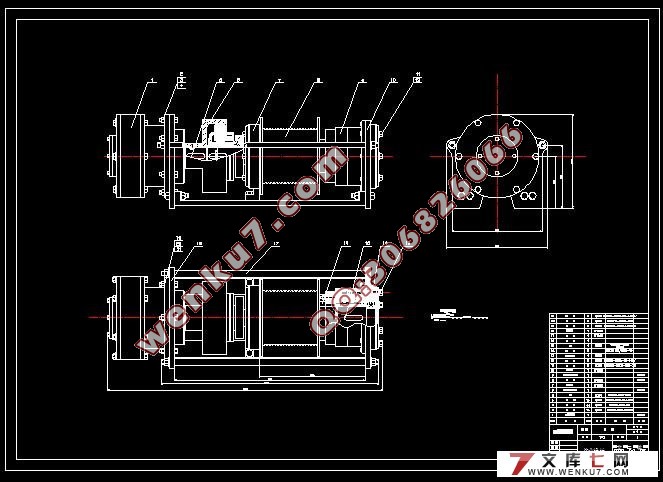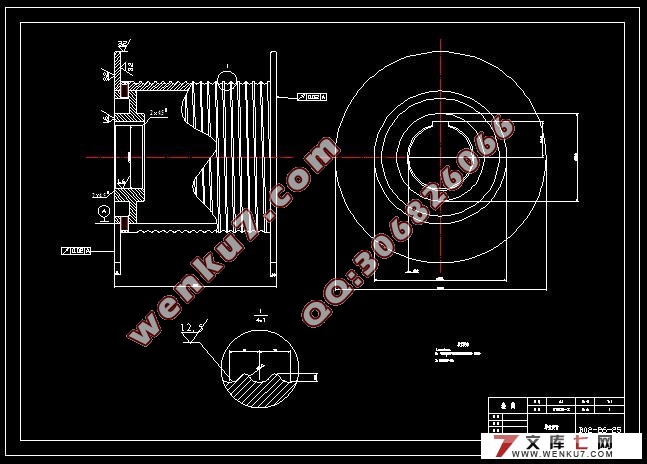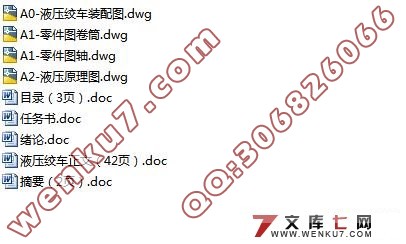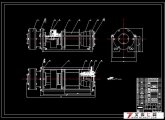卷扬机液压绞车设计
来源:wenku7.com 资料编号:WK74008 资料等级:★★★★★ %E8%B5%84%E6%96%99%E7%BC%96%E5%8F%B7%EF%BC%9AWK74008
以下是资料介绍,如需要完整的请充值下载。
1.无需注册登录,支付后按照提示操作即可获取该资料.
2.资料以网页介绍的为准,下载后不会有水印.资料仅供学习参考之用. 密 保 惠 帮助
资料介绍
卷扬机液压绞车设计(任务书,毕业论文说明书15000字,CAD图纸4张)
摘 要
本设计是通过对液压绞车工作原理、工作的环境和工作的特点进行分析,并结合实际,在进行细致观察后,对液压绞车的整体结构进行了设计,对组成的各元件进行了选型、计算和校核。本绞车由进口液压马达、进口平衡阀、常闭多片式制动器、离合器、卷筒、支承轴和机架等部件组成,还可根据需要设计阀组直接集成于马达配油器上,如带平衡阀、高压梭阀、调速换向阀或其它性能的阀组。在结构上具有紧凑、体积小、重量轻、外型美观等特点,在性能上则具有安全性好、效率高、启动扭矩大、低速稳定性好、噪音低、操作可靠等特点,在提升和下放工作中运转相当平稳,带离合器的绞车可实现自由下放工况,广泛适用于铁道机车和汽车起重机、船舶、油田钻采、地质勘探、煤矿、港口等各种起重设备中。
关键词:液压绞车;计算;校核;阀组
Abstract
This design is to analyze the working principle,the working environment and the working characteristic of the hydraulic winch,and union reality,after the careful observation,I design the overall construction,and choose,compute and examine the various parts of the hydraulic winch. The winch is made up of the import hydraulic motor,import balancing valve,the brake of many pieces,coupling,reel,supporting axle and rack . Also we may design the valve group for the distributor of the motor,like with balancing valve,high-pressured shuttle valve,velocity modulation cross valve or other performance valve groups. The characteristic of the construction is compact ,small,light,beautiful and so on,the characteristic of the performance is safe,the high efficiency,the big start torque,the best low-speed stability characteristic,the low noise,the reliable operation. The winch is quite steadily in the work of promotion and relaxation ,The winch with the coupling also may release the things free ,It is popular to the railroad locomotive ,the auto hoist,the ships, the oil field of drills picks,the geological prospecting,the coal mine,the harbor and the each kind of hoisting equipment.
Key words:Hydraulic winch;Computation;Examination;Valve group



目 录
摘要………………………………………………………………………………………Ⅰ
Abstract ………………………………………………………………………………Ⅱ
第1章 绪论……………………………………………………………………………1
1.1液压传动系统概论……………………………………………………………1
1.1.1传动类型及液压传动的定义………………………………………………1
1.1.2液压系统的组成部分………………………………………………………1
1.1.3液压系统的类型……………………………………………………………1
1.1.4液压技术的特点……………………………………………………………1
1.2绞车的简介………………………………………………………………………2
1.3拟定绞车液压系统图……………………………………………………………3
第2章卷扬机构的方案设计 ………………………………………………………5
2.1 常见卷扬机构方案及分析 ………………………………………………5
2.1.1 非液压式卷扬机构方案比较 ………………………………………5
2.1.2卷筒轴及件速器输出轴连接方式设计的基本原则……………………6
2.1.3液压卷扬机构的分类……………………………………………………7
2.1.4液压式行星齿轮传动卷扬机构布置方案………………………………8
2.2本设计所采用的方案……………………………………………………………10
2.3卷扬机构方案设计注意事宜……………………………………………………10
第3章卷扬机构组成及工作过程分析……………………………………………12
3.1卷扬机构的组成…………………………………………………………………12
3.2卷扬机构工作过程分析…………………………………………………………12
3.2.1卷扬机构的工作周期……………………………………………………12
3.2.2载荷升降过程的动力分析………………………………………………12
第4章卷扬机卷筒的设计和钢丝绳的选用………………………………………15
4.1卷扬机卷筒的设计………………………………………………………………15
4.1.1卷扬机卷筒组的分类和特点……………………………………………15
4.1.2卷筒设计计算……………………………………………………………15
4.2钢丝绳的选择…………………………………………………………………19
第5章液压马达和平衡阀的选择…………………………………………………20
5.1液压马达的选用与验算………………………………………………………20
5.1.1液压马达的分类及特点…………………………………………………20
5.1.2液压马达的选用…………………………………………………………20
5.1.3马达的验算………………………………………………………………20
5.2平衡阀的计算与选用……………………………………………………………23
5.2.1平衡阀的功能简介………………………………………………………23
5.2.2平衡阀的选用……………………………………………………………23
第6章制动器的设计与选用………………………………………………………25
6.1制动器的作用、特点及动作方式………………………………………………25
6.2制动器的设计计算………………………………………………………………26
6.2.1制动转矩的计算…………………………………………………………26
6.2.2制动盘的设计选用………………………………………………………26
6.2.3制动盘有效摩擦直径计算………………………………………………26
6.2.4制动器散热的验算………………………………………………………27
6.2.5全盘式制动器设计计算…………………………………………………30
第7章离合器的设计与选用………………………………………………………31
7.1离合器的功用、特点与分类…………………………………………………31
7.2圆盘离合器主要性能参数的计算……………………………………………32
7.2.1离合器的计算转矩………………………………………………………32
7.2.2圆盘摩擦片的主要尺寸关系……………………………………………32
7.2.3摩擦式离合器的摩擦转矩………………………………………………33
7.2.4圆盘摩擦离合器压力的计算……………………………………………34
第8章轴的设计………………………………………………………………………36
8.1轴的材料…………………………………………………………………………36
8.2轴的工作能力的计算……………………………………………………………36
8.3轴的结构设计……………………………………………………………………39
8.3.1拟定轴上零件的装配方案………………………………………………39
8.3.2根据轴向定位要求确定轴的各段直径和长度…………………………40
8.3.3轴上零件的周向定位……………………………………………………40
结论………………………………………………………………………………………33
参考文献 ………………………………………………………………………………36
致谢………………………………………………………………………………………38
附录………………………………………………………………………………………40
|







